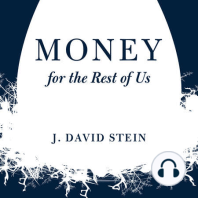25 min listen
Is Anything Scarce Anymore?
ratings:
Length:
30 minutes
Released:
Feb 14, 2018
Format:
Podcast episode
Description
#192 In this episode we explore scarcity. Artificial scarcity created by laws and real scarcity created by our evolving lifestyles and economy. We'll see that most physical products, with drinking water being an exception, are becoming less scarce while trust and attention are becoming more scarce. More information, including show notes, can be found here.Episode Summary – Is Anything Scarce Anymore?Scarce goods and services have been a topic of debate since the original intellectual property (IP) laws were created. Products are getting cheaper to produce, but high-quality services are still in demand. On this episode of Money For the Rest of Us, David tackles the issue of scarcity with clear explanations and timely resources that are sure to help you understand this complex idea. You don’t want to miss his insights, so be sure to listen to this episode.The history of economics, scarcity, and why intellectual property laws are outdatedDavid explains on this episode that the original purpose for IP laws was to ensure people would continue to create quality ideas and content. While these laws worked in theory, they created a level of artificial scarcity. Mark Lemley of Stanford Law, explains that “IP rights are designed to artificially replicate scarcity where it would not otherwise exist. In its simplest form, IP law takes public goods that would otherwise be available to all and artificially restricts their distribution. It makes ideas scarce because then we can bring them into the economy and charge for them, and economics knows how to deal with scarce things.” While certain protections should be given to creators, scarcity needs to occur in an organic way in order for it to be effective. David illuminates this concept through the lens of TED talks and conferences. TED is able to publish all of their talks online – with full audio, video, and transcripts – because tickets to the physical conference cost hundreds or thousands of dollars.How free content can still be turned into a money-making ventureDavid features Cory Doctorow’s work on scarcity on this episode, and quotes him as saying “Although it’s hard to turn fame into money in the arts, it’s impossible to turn obscurity into money in the arts.” Essentially, even if a creator produces exceptional content, no one will know about it if they’re 100% obscure and protected. Technically speaking, this aversion to positive externalities permits the creator to live in fear of someone benefiting from their work for free. Without digital and word-of-mouth exposure, you won’t make money – period. Thus, the free content you produce and distribute can drive interested parties towards your other content, such as books or fee-for-service courses. There will always be paying customers for quality work, even if you have to get them to the door with free content.What elements are actually scarce in the 21st-century marketplace?While physical goods and products aren’t as scarce as they once were, scarcity is still widely prevalent in intangible elements such as trust, attention, and time. David features Seth Godin’s work on this episode of Money For the Rest of Us as he explains, “Trust is scarce because it’s not a simple instinct and it’s incredibly fragile, disappearing often in the face of greed, shortcuts or ignorance. And attention is scarce because it doesn’t scale. We can’t do more than one thing at a time, and the number of organizations and ideas that are competing for our attention grows daily.”The connections between automation, scarcity, and value in today’s societyIt’s much easier to automate a vehicle assembly line than it is teaching a child to read. This simple idea of product versus service connects to the broader idea of scarcity because even though it’s much easier to produce goods efficiently and cheaply, most services could never attain that level of automation. David explains that for each episode of Money For the Rest of Us, he spends 8 to 10 hours in pre-production,
Released:
Feb 14, 2018
Format:
Podcast episode
Titles in the series (100)
Why You Should Care About the Economy by Money For the Rest of Us
